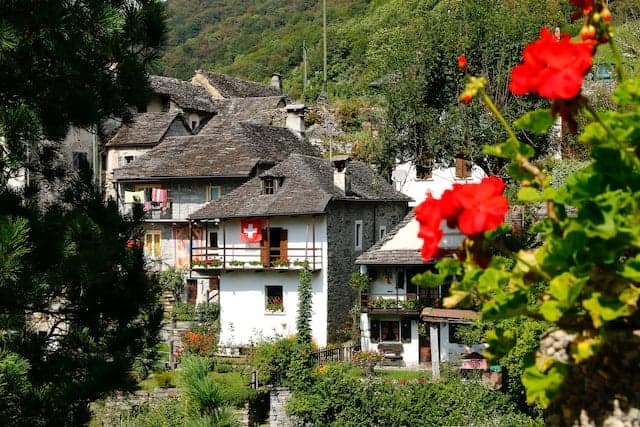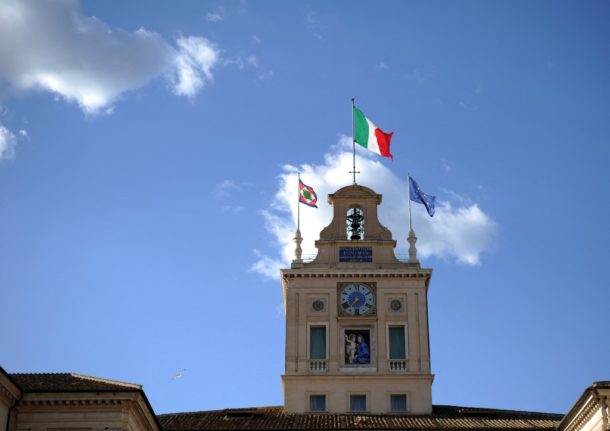Swiss Italian vs standard Italian: What are the key differences?

Italian is one of Switzerland's four official languages (alongside Swiss German, French and Romansh). But just how does Swiss Italian differ from the Italian spoken in Italy?
Languages spoken in multiple countries and cultures inevitably develop their own local expressions, new vocabulary, and sometimes even differences in grammar and pronunciation.
Swiss Italian, which is spoken predominantly in the canton of Ticino and the southern part of Graubünden, also known as Canton Grigioni, is no exception.
How is Swiss Italian different from mainland Italian?
There are many regional variations of standard Italian in Italy itself.
However, Swiss Italian is the variety of the language spoken natively by around 700,000 people across Switzerland, including Swiss people from the Italian-speaking part of Switzerland, Italian immigrants as well as Swiss citizens with an Italian citizenship.
While the key distinctions between Swiss Italian and standard Italian can be found in their shared – and not so shared – vocabulary and idioms, differences can also be found in their grammar and manner of speaking. This is largely due to the fact that Swiss Italian, unlike standard Italian, borrows words from its neighbouring German and French-speaking cantons.
Vocabulary
Though many Swiss would argue that Swiss Italian and standard Italian are virtually identical, a short stint across the southern border is sure to prove them wrong – at the latest when being asked to present their driving licence.
In Swiss Italian, a driving licence is called a licenza di condurre, which is borrowed from the French permis de conduire. This Helvetic expression is unlikely to ring a bell in Italy, however, where a driving licence is known as a patente di guida. While on the road, remember that Italian motorways do not require a motorway vignetta and therefore, also lack a fancy word for the very Swiss car sticker. In Italy, the vignetta is simply referred to as a bollino or contrassegno.

Learning Italian in Switzerland? Keep an eye out for the differences to other forms of Italian. Photo by Green Chameleon on Unsplash
Should you come down with the flu while taking in the stunning sights in Italy, don’t bother explaining you’re unwell with the grippe. The popular Swiss Italian word for flu is not used in Italy and has in fact been borrowed from both the German Grippe and French grippe. Therefore: when in Italy, do as the Italians do and try saying influenza instead.
READ ALSO: What you need to know about languages in Switzerland
If you’ve finally been understood, the pharmacist might recommend some medicinale or farmaco. The Swiss Italian equivalent, medicamento, is not used in Italy.
When in Italy, you may very well be drawn to the shopping streets of Milan for some bargain shopping - but not so fast! If you’re on the lookout for a great deal, refrain from asking the sales assistant for some azione (German: Aktion). In Standard Italian, azione translates to action, while Italians call sales promozione and special offers are referred to as offerta speciale.
Grammar
While the odd Swiss Italian word may very well evoke a chuckle from its southern neighbour, other – grammatically incorrect – expressions may be received less favourably.
One of the topics most people have in common is without a doubt the weather. But when bringing up this seemingly innocent ice breaker with a Standard Italian speaker, you may be met with a surprising look. In Italy, the weather forecast – meteo - is strictly masculine, while Swiss Italian speakers use the feminine form when discussing the topic.
Additionally, Swiss Italian also has far fewer words with English due to its use of the French vocabulary. The calques (loan words) from the latter in Swiss Italian more often match words with a Latin origin than the Standard Italian words do.
One word, two meanings
Some may say it is easy enough to learn two different words for one and the same thing, but what if those words happen to have more than one meaning?
Numerous Swiss Italian terms prove confusing to their Italian neighbours, one of them being ghette, a word that is familiar to both, but carries a different meaning across the border. In Switzerland, ghette (IT: calzamaglia) means tights, while the word translates to leggings in Italy.
READ ALSO: Just how good are the Swiss at speaking the country's different languages
Similarly, the Swiss Italian word for multiple plugs can set Italian pulses racing – and not in a good way. In Switzerland, multiple plugs are referred to as ladro, which in Italy means thief. Ciabatta, the Standard Italian word for multiple plugs, on the other hand, means slipper in Italian-speaking Switzerland.

The Italian language differs in Italy and Switzerland. Photo by Gabriel BOUYS / AFP
The Swiss Italian word for household, fuoco, translates to fire in Italy where nucleo familiare is used to describe a household, while cicca (IT: gomma da masticare) means chewing gum in Swiss Italian and cigarette butt in Standard Italian. Meanwhile, cigarette butt is called mozzicone in the canton of Ticino.
If you thought that things couldn’t possibly get any trickier, the word “easy” would like to have a word. In Swiss Italian, evidente translates to easy, while Standard Italian uses the word facile. And just to complicate matters: evidente in Standard Italian means obvious – just like in French.
Speaking tone
While there are almost no vocal differences between Swiss Italian and Standard Italian, Swiss Italian speakers are said to speak just a little slower and place more emphasis on a clear pronunciation compared to, for instance, their nearby Northern Italian neighbours. The latter’s accents, in turn, sound stronger and are more influenced by their surrounding dialects.
More generally, speakers of Swiss Italian are described as speaking in a more structured manner, making use of school taught Italian, whereas Italian speakers in Italy are said to favour a more laidback speaking approach, incorporating many locally used words away from a strict standard Italian dialect.
READ ALSO: 18 interesting facts about Switzerland's fourth language, Romansh
If you’re an Italian speaker and are keen to hear some of those differences for yourself, some say the easiest way to do so is to tune into TG Svizzera and wait for some political news. According to some, the distinction between Swiss Italian and standard Italian can be best observed when speakers of the former discuss the controversial topic due to using very different politics vocabulary.
Comments
See Also
Languages spoken in multiple countries and cultures inevitably develop their own local expressions, new vocabulary, and sometimes even differences in grammar and pronunciation.
Swiss Italian, which is spoken predominantly in the canton of Ticino and the southern part of Graubünden, also known as Canton Grigioni, is no exception.
How is Swiss Italian different from mainland Italian?
There are many regional variations of standard Italian in Italy itself.
However, Swiss Italian is the variety of the language spoken natively by around 700,000 people across Switzerland, including Swiss people from the Italian-speaking part of Switzerland, Italian immigrants as well as Swiss citizens with an Italian citizenship.
While the key distinctions between Swiss Italian and standard Italian can be found in their shared – and not so shared – vocabulary and idioms, differences can also be found in their grammar and manner of speaking. This is largely due to the fact that Swiss Italian, unlike standard Italian, borrows words from its neighbouring German and French-speaking cantons.
Vocabulary
Though many Swiss would argue that Swiss Italian and standard Italian are virtually identical, a short stint across the southern border is sure to prove them wrong – at the latest when being asked to present their driving licence.
In Swiss Italian, a driving licence is called a licenza di condurre, which is borrowed from the French permis de conduire. This Helvetic expression is unlikely to ring a bell in Italy, however, where a driving licence is known as a patente di guida. While on the road, remember that Italian motorways do not require a motorway vignetta and therefore, also lack a fancy word for the very Swiss car sticker. In Italy, the vignetta is simply referred to as a bollino or contrassegno.

Should you come down with the flu while taking in the stunning sights in Italy, don’t bother explaining you’re unwell with the grippe. The popular Swiss Italian word for flu is not used in Italy and has in fact been borrowed from both the German Grippe and French grippe. Therefore: when in Italy, do as the Italians do and try saying influenza instead.
READ ALSO: What you need to know about languages in Switzerland
If you’ve finally been understood, the pharmacist might recommend some medicinale or farmaco. The Swiss Italian equivalent, medicamento, is not used in Italy.
When in Italy, you may very well be drawn to the shopping streets of Milan for some bargain shopping - but not so fast! If you’re on the lookout for a great deal, refrain from asking the sales assistant for some azione (German: Aktion). In Standard Italian, azione translates to action, while Italians call sales promozione and special offers are referred to as offerta speciale.
Grammar
While the odd Swiss Italian word may very well evoke a chuckle from its southern neighbour, other – grammatically incorrect – expressions may be received less favourably.
One of the topics most people have in common is without a doubt the weather. But when bringing up this seemingly innocent ice breaker with a Standard Italian speaker, you may be met with a surprising look. In Italy, the weather forecast – meteo - is strictly masculine, while Swiss Italian speakers use the feminine form when discussing the topic.
Additionally, Swiss Italian also has far fewer words with English due to its use of the French vocabulary. The calques (loan words) from the latter in Swiss Italian more often match words with a Latin origin than the Standard Italian words do.
One word, two meanings
Some may say it is easy enough to learn two different words for one and the same thing, but what if those words happen to have more than one meaning?
Numerous Swiss Italian terms prove confusing to their Italian neighbours, one of them being ghette, a word that is familiar to both, but carries a different meaning across the border. In Switzerland, ghette (IT: calzamaglia) means tights, while the word translates to leggings in Italy.
READ ALSO: Just how good are the Swiss at speaking the country's different languages
Similarly, the Swiss Italian word for multiple plugs can set Italian pulses racing – and not in a good way. In Switzerland, multiple plugs are referred to as ladro, which in Italy means thief. Ciabatta, the Standard Italian word for multiple plugs, on the other hand, means slipper in Italian-speaking Switzerland.

The Swiss Italian word for household, fuoco, translates to fire in Italy where nucleo familiare is used to describe a household, while cicca (IT: gomma da masticare) means chewing gum in Swiss Italian and cigarette butt in Standard Italian. Meanwhile, cigarette butt is called mozzicone in the canton of Ticino.
If you thought that things couldn’t possibly get any trickier, the word “easy” would like to have a word. In Swiss Italian, evidente translates to easy, while Standard Italian uses the word facile. And just to complicate matters: evidente in Standard Italian means obvious – just like in French.
Speaking tone
While there are almost no vocal differences between Swiss Italian and Standard Italian, Swiss Italian speakers are said to speak just a little slower and place more emphasis on a clear pronunciation compared to, for instance, their nearby Northern Italian neighbours. The latter’s accents, in turn, sound stronger and are more influenced by their surrounding dialects.
More generally, speakers of Swiss Italian are described as speaking in a more structured manner, making use of school taught Italian, whereas Italian speakers in Italy are said to favour a more laidback speaking approach, incorporating many locally used words away from a strict standard Italian dialect.
READ ALSO: 18 interesting facts about Switzerland's fourth language, Romansh
If you’re an Italian speaker and are keen to hear some of those differences for yourself, some say the easiest way to do so is to tune into TG Svizzera and wait for some political news. According to some, the distinction between Swiss Italian and standard Italian can be best observed when speakers of the former discuss the controversial topic due to using very different politics vocabulary.
Join the conversation in our comments section below. Share your own views and experience and if you have a question or suggestion for our journalists then email us at [email protected].
Please keep comments civil, constructive and on topic – and make sure to read our terms of use before getting involved.
Please log in here to leave a comment.